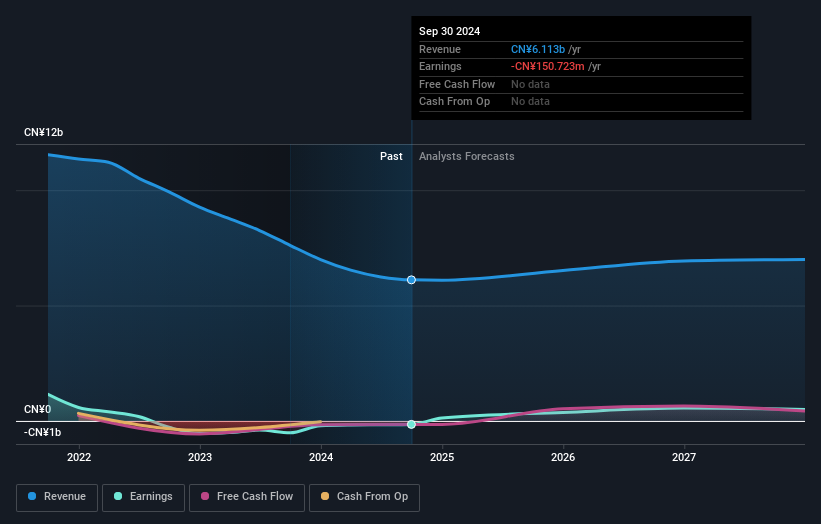- United States
- /
- Entertainment
- /
- NYSE:HUYA
HUYA Inc.'s (NYSE:HUYA) market cap touched US$751m last week, benefiting both public companies who own 66% as well as institutions

Key Insights
- HUYA's significant public companies ownership suggests that the key decisions are influenced by shareholders from the larger public
- Tencent Holdings Limited owns 66% of the company
- Institutional ownership in HUYA is 18%
To get a sense of who is truly in control of HUYA Inc. (NYSE:HUYA), it is important to understand the ownership structure of the business. We can see that public companies own the lion's share in the company with 66% ownership. Put another way, the group faces the maximum upside potential (or downside risk).
While public companies were the group that benefitted the most from last week’s US$102m market cap gain, institutions too had a 18% share in those profits.
Let's delve deeper into each type of owner of HUYA, beginning with the chart below.
View our latest analysis for HUYA

What Does The Institutional Ownership Tell Us About HUYA?
Institutions typically measure themselves against a benchmark when reporting to their own investors, so they often become more enthusiastic about a stock once it's included in a major index. We would expect most companies to have some institutions on the register, especially if they are growing.
We can see that HUYA does have institutional investors; and they hold a good portion of the company's stock. This implies the analysts working for those institutions have looked at the stock and they like it. But just like anyone else, they could be wrong. It is not uncommon to see a big share price drop if two large institutional investors try to sell out of a stock at the same time. So it is worth checking the past earnings trajectory of HUYA, (below). Of course, keep in mind that there are other factors to consider, too.

Hedge funds don't have many shares in HUYA. Our data shows that Tencent Holdings Limited is the largest shareholder with 66% of shares outstanding. With such a huge stake in the ownership, we infer that they have significant control of the future of the company. With 3.7% and 2.3% of the shares outstanding respectively, Teachers Insurance and Annuity Association-College Retirement Equities Fund and Maple Rock Capital Partners Inc. are the second and third largest shareholders.
While it makes sense to study institutional ownership data for a company, it also makes sense to study analyst sentiments to know which way the wind is blowing. Quite a few analysts cover the stock, so you could look into forecast growth quite easily.
Insider Ownership Of HUYA
The definition of company insiders can be subjective and does vary between jurisdictions. Our data reflects individual insiders, capturing board members at the very least. Company management run the business, but the CEO will answer to the board, even if he or she is a member of it.
Insider ownership is positive when it signals leadership are thinking like the true owners of the company. However, high insider ownership can also give immense power to a small group within the company. This can be negative in some circumstances.
Our data cannot confirm that board members are holding shares personally. Not all jurisdictions have the same rules around disclosing insider ownership, and it is possible we have missed something, here. So you can click here learn more about the CEO.
General Public Ownership
With a 16% ownership, the general public, mostly comprising of individual investors, have some degree of sway over HUYA. While this group can't necessarily call the shots, it can certainly have a real influence on how the company is run.
Public Company Ownership
It appears to us that public companies own 66% of HUYA. This may be a strategic interest and the two companies may have related business interests. It could be that they have de-merged. This holding is probably worth investigating further.
Next Steps:
It's always worth thinking about the different groups who own shares in a company. But to understand HUYA better, we need to consider many other factors.
I like to dive deeper into how a company has performed in the past. You can find historic revenue and earnings in this detailed graph.
Ultimately the future is most important. You can access this free report on analyst forecasts for the company.
NB: Figures in this article are calculated using data from the last twelve months, which refer to the 12-month period ending on the last date of the month the financial statement is dated. This may not be consistent with full year annual report figures.
Valuation is complex, but we're here to simplify it.
Discover if HUYA might be undervalued or overvalued with our detailed analysis, featuring fair value estimates, potential risks, dividends, insider trades, and its financial condition.
Access Free AnalysisHave feedback on this article? Concerned about the content? Get in touch with us directly. Alternatively, email editorial-team (at) simplywallst.com.
This article by Simply Wall St is general in nature. We provide commentary based on historical data and analyst forecasts only using an unbiased methodology and our articles are not intended to be financial advice. It does not constitute a recommendation to buy or sell any stock, and does not take account of your objectives, or your financial situation. We aim to bring you long-term focused analysis driven by fundamental data. Note that our analysis may not factor in the latest price-sensitive company announcements or qualitative material. Simply Wall St has no position in any stocks mentioned.
About NYSE:HUYA
HUYA
Through its subsidiaries, operates game live streaming platforms in the People’s Republic of China.
Excellent balance sheet with moderate growth potential.
Market Insights
Community Narratives



